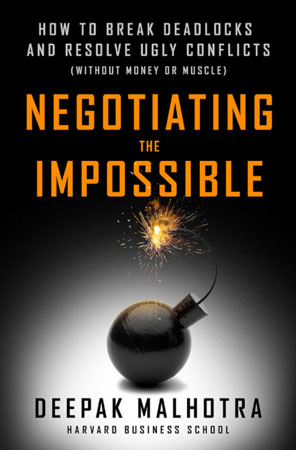Just after Deepak Malhotra gave a talk to a room full of CIOs at the 2019 .NEXT Conference, the Harvard Business School professor tweeted out valuable insights: “Don’t think of your negotiation as a spot transaction. Think of it as a value-creating journey.”
His advice couldn’t have come at a better time. With demand for IT outsourcing surging – it’s now an $85.6 billion market, according to Statista – clients and vendors face many complex long-term business negotiations.
Bargaining about technology, whether it’s inking a software licensing deal or implementing a company-wide network, can be more complex than other business negotiations, according to Harvard Law School’s Program on Negotiation. With new and evolving technologies like cloud computing, negotiating contracts that might be based on outcomes rather than outputs requires flexible and agile bargaining skills.

Malhotra, author of Negotiating the Impossible, outlined several ways to negotiate successfully.
Negotiate Interests, Not Positions
Forging successful partner relationships begins with negotiating interests over positions.
“Your positions are what you want: I want more money, I want exclusivity, I want the deal done in six weeks. Your interests are why you want it,” Malhotra told .NEXT attendees.
“People are always making demands and stating their positions, but effective negotiators find a way to figure out the underlying motivation.”
Cultivate a Learning Mindset
“Walk into every future negotiation with a learning mindset,” Malhotra said. “That means finding out who is relevant to the negotiation, who else they’re talking to, what they care about, which problem they’re trying to solve and where they might have flexibility. The better you understand their interests, constraints, alternatives and perspectives, the more likely you are to navigate the negotiation.”
The most critical characteristic to cultivate while negotiating, said Malhotra, is empathy.
“Go in there with a genuine desire to understand the other parties,” he said.
Negotiate Process Before Substance
Negotiations can last months, so Malhotra recommended asking how long it takes their organization to approve a deal, who needs to be on board, what might slow things down or speed things up and how to set appropriate milestones.
“You're not making any offers or getting any counter-offers,” he said. “You're trying to get clarity and commitment to shape the process.”
Control the Frame of the Negotiation
Successful negotiators are masters at controlling the frame of the negotiation. When Malhotra recently worked with a small company about to negotiate with a larger one, he encouraged the smaller team to recognize the value they bring to the table.
“The last thing we want…is for them to think that we should feel lucky to be in the same room as them,” he said. “We can't let that frame take hold. We don't feel lucky to be there; we feel like an equal partner in this negotiation.”
Handle Ultimatums
“If somebody makes an ultimatum, my typical response is to simply ignore it, move on and address every other thing except that ultimatum,” he said.
He said ultimatums can’t be avoided if the other side is the one interested in making them, so he advises ignoring or reframing them.
“You never want to force people to choose between doing what's smart and doing what makes them look good. Make sure they're not stuck in that corner. When you ignore it, you give both sides an opportunity to come back to it in a different way.”
Not Every Negotiation Ends With a Deal — And That’s OK.
“If we're not the right partners for each other, the negotiation should end with no deal,” said Malhotra.
“The most effective negotiators understand that what's not negotiable today may be negotiable tomorrow. And when you have that mindset…you start seeing opportunities that you wouldn't have seen otherwise.”
Feature image by rawpixel.com from Pexels
Wendy Helfenbaum is a Montreal journalist and TV producer. Follow her on Twitter @wendyhelfenbaum.
© 2019 Nutanix, Inc. All rights reserved. For additional legal information, please go here.
